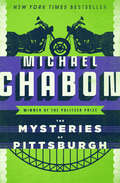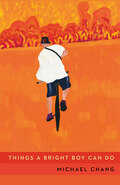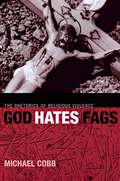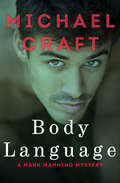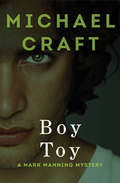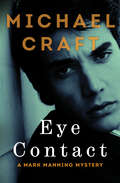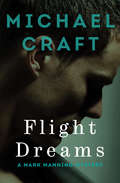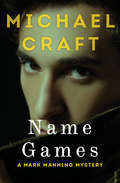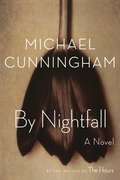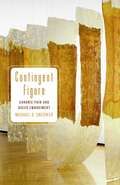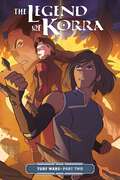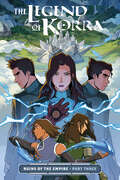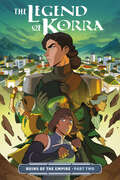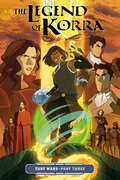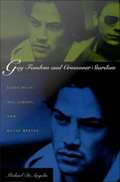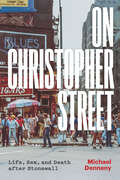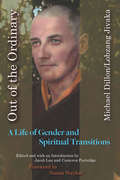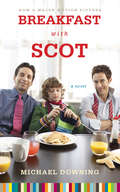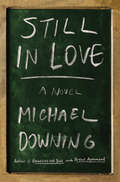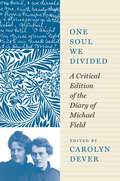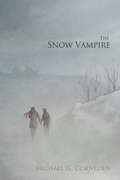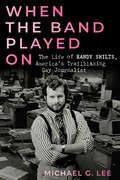- Table View
- List View
The Mysteries of Pittsburgh (P. S. Series)
by Michael ChabonThe Pulitzer Prize–winning author&’s &“astonishing&” debut novel, about a son&’s struggle to find his own identity and integrity (The New York Times). Michael Chabon, author of The Amazing Adventures of Kavalier & Clay, Moonglow, and The Yiddish Policeman&’s Union, is one of the most acclaimed talents in contemporary fiction. The Mysteries of Pittsburgh, published when Chabon was just twenty-five, is the beautifully crafted debut that propelled him into the literary stratosphere. Art Bechstein may be too young to know what he wants to do with his life, but he knows what he doesn&’t want: the life of his father, a man who laundered money for the mob. He spends the summer after graduation finding his own way, experimenting with a group of brilliant and seductive new friends: erudite Arthur Lecomte, who opens up new horizons for Art; mercurial Phlox, who confounds him at every turn; and Cleveland, a poetry-reciting biker who pulls him inevitably back into his father&’s mobbed-up world. A New York Times bestseller, The Mysteries of Pittsburgh was called &“astonishing&” by Alice McDermott, and heralded the arrival of one of our era&’s great voices. This ebook features a biography of the author.
Things a Bright Boy Can Do
by Michael ChangIn Michael Chang's latest, all the world's a vaudeville stage, and this poet is its jester with a knife.Like an elongated diss track, Chang's poems go from flirty to righteous, wrathful to lackadaisical, all in the span of one page. The titans of pop culture and poetry wrestle at Chang’s whimsy, their poems a series of flings and retorts at the end of a late-night spree. Like a compendium of American poetics, this collection breezily changes style and mood as easily as a prom queen smiles beneath the crown. With nods to O’Hara and Ashbery, the poems in Things a Bright Boy Can Do flit from the sewage of Americana to the heights of ecstatic experience. Each poem is a playground meant to delight readers before they skip along. With each successive book, Michael Chang showcases a poet at home in the twenty-first century; nothing is too silly or too morbid for the page. When reading Chang’s poetry, the madness of interpreting the social media age suddenly makes sense. You can’t help but join in on the heckling, sticking your tongue out in the face of our strange world.“Michael Chang is back, with their signature irrepressibility: the voice that bubbles with endlessly exuberant wit, encyclopedic pop culture references, playful orthography, and intense emotion. Oh, yes – these poems are in their feelings! Are you here for poetry that can lure Superman, Dolly Parton, and Prince allusions together? Are you up for parataxis with a vengeance? If wordplay and irreverence are music to your ears, tune into Things a Bright Boy Can Do.” – Evie Shockley, author of Suddenly We“Michael Chang’s Things a Bright Boy Can Do pushes and pushes, and then pushes some more. It’s provocative, fearless, and relentless, unafraid to reinvent tone, grammar, and just about everything else that dares to enter the path of Chang’s perception. Things a Bright Boy Can Do is a ride on the back of a new modern language.” – Victoria Chang, author of The Trees Witness Everything
God Hates Fags: The Rhetorics of Religious Violence (Sexual Cultures #20)
by Michael Cobb2007 Choice Outstanding Academic TitleAt the funeral of Matthew Shepard—the young Wyoming man brutally murdered for being gay—the Reverend Fred Phelps led his parishioners in protest, displaying signs with slogans like “Matt Shepard rots in Hell,” “Fags Die God Laughs,” and “God Hates Fags.” In counter-protest, activists launched an “angel action,” dressing in angel costumes, with seven-foot high wings, and creating a visible barrier so one would not have to see the hateful signs.Though long thought of as one of the most virulently anti-gay genres of contemporary American politics and culture, in God Hates Fags, Michael Cobb maintains that religious discourses have curiously figured as the most potent and pervasive forms of queer expression and activism throughout the twentieth century. Cobb focuses on how queers have assumed religious rhetoric strategically to respond to the violence done against them, alternating close readings of writings by James Baldwin, Tennessee Williams, Jean Toomer, Dorothy Allison, and Stephen Crane with critical legal and political analyses of Supreme Court Cases and anti-gay legislation. He also pays deep attention to the political strategies, public declarations, websites, interviews, and other media made by key religious right organizations that have mounted the most successful regulations and condemnations of homosexuality.
Body Language (The Mark Manning Mysteries #3)
by Michael CraftA gay Chicago reporter returns to his Wisconsin hometown—and a morass of lust, lies, and lethal family secrets in this &“neatly twisted&” mystery (Booklist). An unexpected windfall has given burned-out Chicago journalist Mark Manning the chance to reconnect with his boyhood roots. With the blessing of his lover, Neil, he leaves the Windy City to return to Dumont, Wisconsin, to take over the town paper. His long-awaited family reunion is cut short when his cousin Suzanne is bludgeoned to death just before Christmas dinner. Before she dies, she whispers something to Manning: the name of her son. Was she expressing a mother&’s dying wish for the future welfare of her child? Or revealing the identity of her murderer? When Manning ends up in the local law&’s sights, he&’s suddenly racing against time to clear his own name and smoke out a killer. With no lack of suspects, from a troubled homophobe to a lesbian activist to a housekeeper, the clock is ticking on a story that could be the biggest of Manning&’s career—if he lives long enough to write it. Body Language is the third book in Michael Craft&’s Mark Manning series, which begins with Flight Dreams and Eye Contact.
Boy Toy: A Mark Manning Mystery (The Mark Manning Mysteries #5)
by Michael CraftJournalist Mark Manning&’s Midwestern hometown closes ranks against him when his nephew is suspected of murder For Mark Manning, running the local paper in his Wisconsin hometown is a refreshing change from his life as a hard-charging reporter for the Chicago Journal. Together with his partner, architect Neil Waite, he&’s settling into scenic, sleepy Dumont, whose inhabitants have welcomed them into their fold. Until Manning&’s nephew becomes the prime suspect in a murder case. Teenagers Thad Quatrain and Jason Thrush alternated the lead role in the community theatre&’s production of Teen Play. Now Jason lies dead in his bedroom, the victim of mushroom poisoning. Amid rumors that Thad threatened to kill Jason, the town begins to turn against him. As a sweltering summer draws to an end, a shocking revelation has tempers seething—and threatening to boil over. A novel about sexual identity, desire, and the lies we tell ourselves, Boy Toy explores the secret passions that war within the human heart. Boy Toy is the fifth book in Michael Craft&’s Mark Manning series, which begins with Flight Dreams and Eye Contact.
Eye Contact
by Michael CraftIt begins as a simple assignment for Chicago Journal reporter Mark Manning. He's been hired to replace colleague, Cliff Nolan, on a top story. Renowned astrophysicist, Pavo Zarnik, claims to have discovered a tenth planet, but to the skeptical reporter, there is no story because there is no proof. Then Manning makes some startling discoveries of his own: Nolan's body with a bullet hole in his back and the last interview with Zarnik is missing. Now the story is no longer a matter of metaphysics, but of murder. It's not just foul play and a puzzle that capture Manning's imagination. His new assistant, twenty-four-year-old David Bosch, awakens every yearning that Manning has struggled to keep in check since building his new life with two-year lover Neil Waite. Now, while Manning and David quickly pick up on the murderer's trail, a desperate predator has marked someone close to Manning. But Manning is driven even harder as he comes closer to the truth ... and to a damning piece of evidence the killer will do anything to destroy. Even if it means committing murder again.
Eye Contact (The Mark Manning Mysteries #2)
by Michael CraftReporter Mark Manning searches for a killer and stumbles upon a stunning conspiracy Chicago Journal reporter Mark Manning has been called in to replace a colleague on a big story. Famed Swiss astrophysicist Pavo Zarnik has just stunned the science world with his announcement that he&’s discovered a tenth planet in our solar system. Manning is skeptical of Zarnik&’s claims and believes he&’s a fraud. His suspicions grow when his fellow reporter—award-winning journalist Clifford Nolan—turns up dead, his laptop missing. Now, Manning is covering two breaking stories and coping with the not-entirely-unwanted advances of twenty-something reporter David Bosch. In a committed relationship with architect Neil Waite, Manning is determined to resist temptation. But he soon has bigger things to worry about. On the edge of a far-reaching political conspiracy, Manning matches wits with a killer whose agenda is about to become chillingly clear. Eye Contact is the second book in Michael Craft&’s Mark Manning series, which also includes Flight Dreams and Body Language.
Flight Dreams (The Mark Manning Mysteries #1)
by Michael CraftA masterpiece of mystery and suspense, this is the moving story of a man struggling to come to terms with his sexuality Investigative journalist Mark Manning is on the trail of a story that could make his career. Airline heiress Helena Carter, who vanished seven years ago, is about to be declared legally dead. Her fortune, valued at over one hundred million dollars, will go to the Catholic Archdiocese of Chicago and the Federated Cat Clubs of America. Manning is the only one who believes that the missing Chicago socialite is still alive. And he&’s just been given an ultimatum by his publisher: Prove it, or he&’s history. Determined to keep his job—and hoping to secure the five-hundred-thousand-dollar reward from Carter&’s estate, as well as the coveted Partridge Prize for investigative journalism—Manning enters a world of religious fanatics who could turn back the clock on gay rights. At the same time, Manning grapples with his own sexuality as he falls in love for the first time—with the man of his dreams. Flight Dreams is the first book in Michael Craft&’s Mark Manning series, which continues with Eye Contact and Body Language.
Name Games: A Mark Manning Mystery (The Mark Manning Mysteries #4)
by Michael CraftJournalist Mark Manning delves into the bizarre world of miniatures . . . and finds a king-sized case of murderFront-page news in the quiet town of Dumont, Wisconsin, where former Chicago reporter Mark Manning runs the town&’s Daily Register, involves the annual exhibition of the Midwest Miniatures Society and new zoning laws for an adult bookstore. But murder becomes the headline when &“King of Miniatures&” Carrol Cantrell, the nation&’s foremost expert, is found strangled in the guesthouse of a local shop owner. It seems Cantrell was leading a double life. He was having an affair with Doug Pierce, Dumont&’s closeted sheriff and a good friend of Manning&’s. With a blackmail note pointing to his guilt, Pierce soon becomes the prime suspect. Enlisting the help of colleagues, friends, and his lover, Neil, Manning races to clear Pierce&’s name . . . and finds himself enmeshed in the seething rivalries and vicious back-stabbing that characterize the cutthroat worlds of miniatures and pornography. With suspects ranging from a gay-bashing feminist to a renowned French craftsman of miniatures, Manning unearths a hotbed of damning secrets someone has killed—and could kill again—to keep. Name Games is the fourth book in Michael Craft&’s Mark Manning series, which begins with Flight Dreams and Eye Contact.
By Nightfall: A Novel
by Michael CunninghamPeter and Rebecca Harris: mid-forties denizens of Manhattan's SoHo, nearing the apogee of committed careers in the arts--he a dealer, she an editor. With a spacious loft, a college-age daughter in Boston, and lively friends, they are admirable, enviable contemporary urbanites with every reason, it seems, to be happy. Then Rebecca's much younger look-alike brother, Ethan (known in thefamily as Mizzy, "the mistake"), shows up for a visit. A beautiful, beguiling twenty-three-year-old with a history of drug problems, Mizzy is wayward, at loose ends, looking for direction. And in his presence, Peter finds himself questioning his artists, their work, his career--the entire world he has so carefully constructed. Like his legendary, Pulitzer Prize-winning novel, The Hours, Michael Cunningham's masterly new novel is a heartbreaking look at the way we live now. Full of shocks and aftershocks, it makes us think and feel deeply about the uses and meaning of beauty and the place of love in our lives.
Contingent Figure: Chronic Pain and Queer Embodiment
by Michael D. SnedikerA masterful synthesis of literary readings and poetic reflections, making profound contributions to our understanding of chronic painAt the intersection of queer theory and disability studies, acclaimed theorist Michael D. Snediker locates something unexpected: chronic pain. Starting from this paradigm-shifting insight, Snediker elaborates a bracing examination of the phenomenological peculiarity of disability, articulating a complex idiom of figuration as the lived substance of pain&’s quotidian. This lexicon helps us differently inhabit both the theoretical and phenomenal dimensions of chronic pain and suffering by illuminating where these modes are least distinguishable. Suffused with fastidious close readings, and girded by a remarkably complex understanding of phenomenal experience, Contingent Figure resides in the overlap between literary theory and lyric experiment. Snediker grounds his exploration of disability and chronic pain in dazzling close readings of Herman Melville, Emily Dickinson, Henry James, and many others. Its juxtaposition of these readings with candid autobiographical accounts makes Contingent Figure an exemplary instance of literary theory as a practice of lyric attention.Thoroughly rigorous and anything but predictable, this stirring inquiry leaves the reader with a rich critical vocabulary indebted to the likes of Maurice Blanchot, Gilles Deleuze, D. O. Winnicott, and Eve Kosofsky Sedgwick. A master class in close reading&’s inseparability from the urgency of lived experience, this book is essential for students and scholars of disability studies, queer theory, formalism, aesthetics, and the radical challenge of Emersonian poetics across the long American nineteenth century.
The Legend of Korra Turf Wars Part Two
by Michael Dante DiMartinoRecovering from the fight and furious for revenge, Triple Threats member Tokuga solidifies his ties with the duplicitous Wonyong. Meanwhile, when Republic City&’s housing crisis reaches its peak, Zhu Li sets her sights on the biggest public figure in the city—President Raiko—in a bid for the presidency! With her friend&’s success, the future of the spirit portal, and the wellbeing of Republic City&’s citizens at stake, can Korra remain neutral and fulfill her duties as the Avatar?Written by series co-creator Michael Dante DiMartino and drawn by Irene Koh (Teenage Mutant Ninja Turtles, Afrina and the Glass Coffin), with consultation by Bryan Konietzko, this is the official continuation of The Legend of Korra!
The Legend of Korra: Ruins of the Empire Part Three
by Michael Dante DiMartinoKuvira's true nature is revealed, and the Earth Kingdom will feel the consequences!Thanks to Commander Guan and Doctor Sheng's brainwashing technology, all hope for a fair election in the Earth Kingdom is lost. Korra works with Toph, Su, and Kuvira to plan a means to rescue not just the brainwashed Mako, Bolin, and Asami, but everyone else caught up in Guan's plan! With the Earth Empire potentially on the rise again, Kuvira pulls another trick from her sleeve . . . but whose side is she truly on? Written by series co-creator Michael Dante DiMartino and illustrated by Michelle Wong (Goosebumps: Download and Die), with consultation by Bryan Konietzko and Tim Hedrick, this is the ultimate continuation of the beloved television series!
The Legend of Korra: Ruins of the Empire Part Two
by Michael Dante DiMartinoWhat will it take to stop a war?King Wu's dreams of peacefully transitioning the Earth Kingdom into a democracy are in danger when Commander Guan throws his political hat in the ring, hoping to subvert the new system from the inside out. But playing fair was never part of his plan; Guan and Dr. Sheng are using terrifying new technology to cement Guan's win! In a desperate attempt to save the Earth Kingdom from falling back into the dark days of conquest and empire, Korra and Kuvira convince an old friend to return and take the former commander on in the polls. But will it be enough? Written by series co-creator Michael Dante DiMartino and illustrated by Michelle Wong (Goosebumps: Download and Die), with consultation by Bryan Konietzko, this is the ultimate continuation of the beloved television series!
The Legend of Korra: Turf Wars Part Three
by Michael Dante DiMartinoWhen Asami is kidnapped, Korra sets out to the Spirit Wilds to find her. Now teeming with dark spirits influenced by the half spirit-half human Tokuga, the landscape is more dangerous than ever before. The two women must trust in each other and work together if they are to make it out alive. Their fate is revealed in this stunning, action-packed conclusion to The Legend of Korra: Turf Wars!Written by series co-creator Michael Dante DiMartino and drawn by Irene Koh (Teenage Mutant Ninja Turtles, Afrina and the Glass Coffin), with consultation by Bryan Konietzko, this is the official continuation of the beloved television series!
Gay Fandom and Crossover Stardom: James Dean, Mel Gibson, and Keanu Reeves
by Michael DeangelisWhy and how does the appeal of certain male Hollywood stars cross over from straight to gay audiences? Do stars lose their cachet with straight audiences when they cross over? In Gay Fandom and Crossover Stardom Michael DeAngelis responds to these questions with a provocative analysis of three famous actors--James Dean, Mel Gibson, and Keanu Reeves. In the process, he traces a fifty-year history of audience reception that moves gay male fandom far beyond the realm of "camp" to places where culturally unauthorized fantasies are nurtured, developed, and shared. DeAngelis examines a variety of cultural documents, including studio publicity and promotional campaigns, star biographies, scandal magazines, and film reviews, as well as gay political and fan literature that ranges from the closeted pages of One and Mattachine Review in the 1950s to the very "out" dish columns, listserv postings, and on-line star fantasy narratives of the past decade. At the heart of this close historical study are treatments of particular film narratives, including East of Eden, Rebel Without a Cause, The Road Warrior, Lethal Weapon, My Own Private Idaho, and Speed. Using theories of fantasy and melodrama, Gay Fandom and Crossover Stardom demonstrates how studios, agents, and even stars themselves often actively facilitate an audience's strategic blurring of the already tenuous distinction between the heterosexual mainstream and the gay margins of American popular culture. In addition to fans of James Dean, Mel Gibson, and Keanu Reeves, those interested in film history, cultural studies, popular culture, queer theory, gender studies, sociology, psychoanalytic theory, melodrama, fantasy, and fandom will enjoy this book.
On Christopher Street: Life, Sex, and Death after Stonewall
by Michael DennenyThrough the eyes of publishing icon Michael Denneny, this cultural autobiography traces the evolution of the US’s queer community in the three decades post-Stonewall. The Stonewall Riots of 1969 and the AIDS crisis of the 1980s have been captured in minute detail, and rightly memorialized in books, on tv, and in film as pivotal and powerful moments in queer history. Yet what about the moments in between—the tumultuous decade post-Stonewall when the queer community’s vitality and creativity exploded across the country, even as the AIDS crisis emerged? Michael Denneny was there for it all. As a founder and editor of the wildly influential magazine Christopher Street and later as the first openly gay editor at a major publishing house, Denneny critically shaped publishing around gay subjects in the 1970s and beyond. At St. Martin’s Press, he acquired a slew of landmark titles by gay authors—many for his groundbreaking Stonewall Inn Editions—propelling queer voices into the mainstream cultural conversation. On Christopher Street is Denneny’s time machine, going back to that heady period to lay out the unfolding geographies and storylines of gay lives and capturing the raw immediacy of his and his contemporaries’ daily lives as gay people in America. Through forty-one micro-chapters, he uses his journal writings, articles, interviews, and more from the 1970s and ‘80s to illuminate the twists and turns of a period of incomparable cultural ferment. One of the few surviving voices of his generation, Denneny transports us back in time to share those vibrant in-between moments in gay lives—the joy, sorrow, ecstasy, and energy—across three decades of queer history.
Out of the Ordinary: A Life of Gender and Spiritual Transitions
by Michael Dillon/Lobzang JivakaNow available for the first time—more than 50 years after it was written—is the memoir of Michael Dillon/Lobzang Jivaka (1915–62), the British doctor and Buddhist monastic novice chiefly known to scholars of sex, gender, and sexuality for his pioneering transition from female to male between 1939 and 1949, and for his groundbreaking 1946 book Self: A Study in Ethics and Endocrinology. Here at last is Dillon/Jivaka’s extraordinary life story told in his own words.Out of the Ordinary captures Dillon/Jivaka’s various journeys—to Oxford, into medicine, across the world by ship—within the major narratives of his gender and religious journeys. Moving chronologically, Dillon/Jivaka begins with his childhood in Folkestone, England, where he was raised by his spinster aunts, and tells of his days at Oxford immersed in theology, classics, and rowing. He recounts his hormonal transition while working as an auto mechanic and fire watcher during World War II and his surgical transition under Sir Harold Gillies while Dillon himself attended medical school. He details his worldwide travel as a ship’s surgeon in the British Merchant Navy with extensive commentary on his interactions with colonial and postcolonial subjects, followed by his “outing” by the British press while he was serving aboard The City of Bath.Out of the Ordinary is not only a salient record of an early sex transition but also a unique account of religious conversion in the mid–twentieth century. Dillon/Jivaka chronicles his gradual shift from Anglican Christianity to the esoteric spiritual systems of George Gurdjieff and Peter Ouspensky to Theravada and finally Mahayana Buddhism. He concludes his memoir with the contested circumstances of his Buddhist monastic ordination in India and Tibet. Ultimately, while Dillon/Jivaka died before becoming a monk, his novice ordination was significant: It made him the first white European man to be ordained in the Tibetan Buddhist tradition.Out of the Ordinary is a landmark publication that sets free a distinct voice from the history of the transgender movement.
Breakfast With Scot
by Michael DowningAn enlightened modern couple faces sudden parenthoodand the embarrassing truth about their own definitions of normalin this hilarious novel chronicling a joyride into the unknown.. Sam and Ed are living the good life: happy, healthy, devoted to each other and their careers, they have no yearning for the joyful mysteries of parenthood. But when eleven-year-old Scots mother suddenly dies, the couple is determined to make good on a wine-soaked promise made years before. With the best intentions, Sam and Ed hang a tire swing in the backyard and call the neighborhood school to arrange enrollment. Scot arrives just in time to start fifth grade--with a pair of lacy white socks in his duffel bag.It doesnt take Sam and Ed long to realize that Scot wont be trying out for the football team. He adores feather boas, wishes the house had better drapes, and keeps Pink Gardenia lotion in his camera bag. Spells of vertigo cause him to drop to the floor in panic, and the kids at school want to beat him up. Breakfast with Scot is a fast-paced, comic novel with resonance for everyone trying to raise children in our relentlessly sophisticated culture. In wry dialogue, frothy characters, and an offbeat plot, Michael Downings mastery reaches new heights of brilliance.
Breakfast with Scot: A Novel
by Michael DowningSam and Ed live the high life, and see no reason to add to their happy twosome. Then 11–year–old Scot's mother dies, and a wine–soaked promise pushes the couple into parenthood. They dutifully make all the usual arrangements, but Scot is far from usual, sporting makeup and enduring bullying at school. Soon Sam and Ed begin to question their parenting, their commitment to each other, and the compromises they've made to live in a straight society. Breakfast with Scot is a humorous, heartwarming novel about the true meaning of family.
Still in Love: A Novel
by Michael DowningThis hilarious, sometimes harrowing, and ultimately heartening novel is the companion to the critically acclaimed, national bestseller Perfect Agreement "Beautifully and economically written, and very funny." —Linda Wertheimer, NPR This is your chance to enroll in English 10 at highly rated Hellman College—if you can find a place to sit in the fantastically overcrowded classroom. Mark Sternum, whom readers first met in Downing’s beloved novel Perfect Agreement, is a veteran teacher. Twenty years older, separated for six months from his longtime lover, and desperate to duck the overtures of double–dealing deans above him and disgruntled adjunct faculty below him, Mark has one ambition every day he is on campus—to close the classroom door and leave the world behind. His escape, however, is complicated by his contentious, complicated wrestling match of a relationship with the Professor, the tenured faculty member with whom Mark has co–taught this creative–writing workshop for ten years. The spectacle of their rigorous, academic relationship is a chance for students—all of us—to learn what an amazing arena the classroom can be. Replete with engaging writing exercises, harsh criticism, and contrarian advice, Still in Love is the story of one semester in a college classroom. And it is an urgent reminder that we desperately need classrooms, that those singular, sealed–off–from–the–world sanctuaries are where we learn to love our lives.
One Soul We Divided: A Critical Edition of the Diary of Michael Field
by Michael FieldThe first book-length selection from the extraordinary unpublished diary of the late-Victorian writer “Michael Field”—the pen name of two female coauthors and romantic partnersMichael Field was known to late-Victorian readers as a superb poet and playwright—until Robert Browning let slip Field’s secret identity: in fact, “Michael Field” was a pseudonym for Katharine Bradley (1846–1914) and Edith Cooper (1862–1913), who were lovers, a devoted couple, and aunt and niece. For thirty years, they kept a joint diary titled Works and Days that eventually reached almost 10,000 pages. One Soul We Divided is the first critical edition of selections from this remarkable unpublished work.A fascinating personal and literary experiment, the diary tells the extraordinary story of the love, art, ambitions, and domestic life of a queer couple in fin de siècle London. It also tells vivid firsthand stories of the literary and artistic worlds Bradley and Cooper inhabited and of their encounters with such celebrities as Browning, Oscar Wilde, W. B. Yeats, Aubrey Beardsley, and Bernard Berenson. Carolyn Dever provides essential context, including explanatory notes, a cast of characters, a family tree, and a timeline.An unforgettable portrait of two writers and their unexpected romantic, literary, and artistic marriage, One Soul We Divided rewrites what we think we know about Victorian women, intimacy, and sexuality.
The Snow Vampire
by Michael G. CorneliusIn 1914 Hungary, Hendrik and Ferenc hide their love amidst the deserted ruins in the hills above their tiny, sheltered town. Hendrik is engaged to Ferenc's younger sister, and a place to escape the rigid strictures of their families is worth braving the legend of the snagov vrolok--the snow vampire--who is said will claim the blood and flesh of anyone foolish enough to wander near. Yet sometimes dark tales are based on truth, and something wicked does lurk in the abandoned monastery. Suddenly the lovers find themselves faced with a heartbreaking choice: brave a world in which their love is impossible or face the evil that lives in the snowy heart of a cold Carpathian mountain. A Bittersweet Dreams title: It's an unfortunate truth: love doesn't always conquer all. Regardless of its strength, sometimes fate intervenes, tragedy strikes, or forces conspire against it. These stories of romance do not offer a traditional happy ending, but the strong and enduring love will still touch your heart and maybe move you to tears.
When the Band Played On: The Life of Randy Shilts, America's Trailblazing Gay Journalist
by Michael G. LeeRandy Shilts was the preeminent LGBTQ+ reporter of his generation. He was the first openly gay reporter assigned to a gay beat at a mainstream paper and one of the nation's most influential chroniclers of gay history, politics, and culture. Shilts wrote three seminal works on the community: The Mayor of Castro Street, on the life, assassination, and legacy of Harvey Milk; And the Band Played On, detailing the failure of politics as usual during the early AIDS epidemic; and Conduct Unbecoming, a history of the US military's mistreatment of LGBTQ servicemembers. Yet the intimate life story of Randy Shilts has been left unwritten. When the Band Played On tells that story, recognizing his legacy as a trailblazing figure in gay activism, journalism, and public policy. Author Michael G. Lee conducted interviews with Shilts's family, friends, college professors, colleagues, informants, lovers, and critics. The resulting narrative tells the tale of a singularly gifted voice, a talented yet insecure young man whose coming of age became intricately linked to the historic peaks and devastating perils of modern gay liberation. When the Band Played On is the authoritative account of Randy Shilts's trailblazing life, as well as his legacy of shaping the history-making events he covered.
